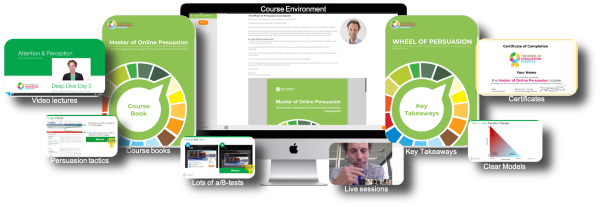[Download] Master of Online Persuasion – Bart Schutz
$699.00 Original price was: $699.00.$45.00Current price is: $45.00.
- Delivery: You Will Receive A Receipt With Download Link Through Email.
- If you need more proof ofcourse, feel free to chat with me!

Description
Table of Contents
ToggleProof of payment:

The digital landscape demands more than just visibility; it requires a profound understanding of human behavior to truly connect and convert. This article delves into the transformative power of mastering online persuasion, exploring how strategic application of behavioral science can elevate digital presence from mere interaction to impactful influence.
Master of Online Persuasion
The journey to becoming a Master of Online Persuasion is an immersive exploration into the intricate dance between human psychology and digital interfaces. It’s about more than just slick designs or catchy slogans; it’s about understanding the invisible threads that guide user decisions, the subconscious biases that shape their perceptions, and the motivations that drive their actions. This comprehensive discipline equips individuals with the tools to dissect digital environments, identify friction points, and craft experiences that resonate deeply with the target audience.
The core of this mastery lies in a rigorous application of behavioral science principles, moving beyond guesswork to informed, data-driven strategies. Imagine a world where every click, every scroll, every interaction is a deliberate step towards a desired outcome, not through manipulation, but through insightful design and ethical influence. This course, “Master of Online Persuasion & Experience Design,” is meticulously structured to teach you precisely that—how to understand and influence user behavior in digital environments by applying these very behavioral science principles.
It’s a dynamic blend of theoretical knowledge and practical application, ensuring that graduates are not just aware of psychological concepts, but are proficient in deploying them to tangible effect. From optimizing conversion rates to fostering deeper engagement and building lasting customer loyalty, the skills acquired are directly translatable to a multitude of digital challenges. The emphasis is on developing a critical lens through which to view online interactions, enabling professionals to identify opportunities for enhancement and to build digital ecosystems that are both effective and ethically sound.
The Psychology of Digital Influence
Understanding the psychology of users is paramount for any aspiring Master of Online Persuasion. It involves delving into the conscious and unconscious processes that drive user decisions, recognizing that much of human behavior online, as in life, is driven by heuristics and biases rather than purely rational thought. Users navigate digital spaces with a myriad of cognitive shortcuts, responding to cues, leveraging social proof, and seeking instant gratification. A deep dive into cognitive psychology reveals how attention is captured, how memory influences choices, and how emotions play a pivotal role in shaping user experience. For instance, the mere exposure effect suggests that repeated exposure to a brand or message can increase its familiarity and likability, a principle often leveraged in retargeting campaigns.
Similarly, the concept of cognitive fluency—the ease with which information is processed—is crucial in designing intuitive interfaces that reduce cognitive load and enhance user satisfaction. When users don’t have to think too hard, they are more likely to proceed. The course emphasizes these foundational psychological principles, providing a robust framework for understanding why users behave the way they do online. It’s about moving beyond anecdotal observations and embracing a scientific approach to understanding the digital mind. Without this fundamental understanding, any attempt at persuasion is akin to shooting in the dark, hoping to hit a target without knowing its location.
Furthermore, this psychological understanding extends to the nuances of decision-making under uncertainty, the impact of scarcity and urgency on perceived value, and the powerful role of reciprocity in building trust and encouraging action. For example, offering valuable content or a free trial can trigger the principle of reciprocity, making users more inclined to return the favor by engaging with a product or service. The course dissects these mechanisms, providing over 130 specific psychological tactics to boost persuasiveness and user experience.
It’s not just about listing these tactics, but about understanding their underlying psychological basis, when to apply them, and how to measure their effectiveness. This knowledge empowers professionals to not only identify effective persuasion techniques but also to anticipate user reactions and proactively design for desired outcomes. The ability to articulate the “why” behind user behavior is a hallmark of a true expert in online persuasion, enabling more sophisticated and impactful digital strategies. It’s the difference between merely presenting information and truly guiding a user through an experience that feels natural, intuitive, and ultimately, fulfilling.
Beyond individual psychological principles, the course also addresses the interplay between various cognitive biases and how they compound to influence user behavior in complex ways. Understanding how confirmation bias can lead users to seek out information that validates their existing beliefs, or how anchoring bias can influence price perception, allows for the design of digital experiences that subtly guide users towards desired conclusions.
This deep psychological insight is crucial for ethical persuasion, ensuring that influence is exerted responsibly and transparently, respecting user autonomy while achieving business objectives. The goal is to create win-win scenarios where users feel understood and valued, and businesses achieve their strategic goals. This holistic understanding of user psychology forms the bedrock upon which all effective online persuasion is built, transforming digital interactions into meaningful engagements.
Applying Behavioral Insights for Impact
The practical application of knowledge is where the theoretical understanding of psychology truly blossoms for a Master of Online Persuasion. It’s not enough to simply know about cognitive biases; the real skill lies in translating that knowledge into actionable strategies that optimize digital strategies, user journeys, and designs for campaigns and A/B tests using behavioral insights. This involves a systematic approach to identifying opportunities for improvement within existing digital landscapes and proactively designing new experiences that are inherently persuasive.
For instance, understanding the “mere exposure effect” can inform the frequency and placement of brand messaging across various touchpoints in a user journey. Similarly, applying the principle of “social proof” might involve strategically displaying testimonials, reviews, or user statistics to build trust and encourage conversion. The course provides a structured methodology for deconstructing digital experiences, from landing pages to checkout flows, through a behavioral lens, identifying points of friction, confusion, or hesitation that can be alleviated through intelligent design.
A core component of applying behavioral insights is the ability to conduct and interpret A/B tests effectively. This isn’t just about changing a button color; it’s about formulating hypotheses based on psychological principles, designing experiments that isolate variables, and rigorously analyzing the results to draw meaningful conclusions. For example, a hypothesis might be that adding an element of urgency (e.g., a countdown timer) will increase conversion rates due to the scarcity principle.
The A/B test would then compare the performance of a page with and without the timer, providing quantitative data to validate or refute the hypothesis. This iterative process of hypothesis generation, experimentation, and analysis is crucial for continuous optimization and for truly understanding what resonates with a specific audience. The course delves into best practices for A/B testing, ensuring that professionals can move beyond superficial changes to implement profound, behaviorally informed improvements. It’s about making data-driven decisions that are grounded in a deep understanding of human psychology, leading to sustained improvements in key performance indicators.
Moreover, applying behavioral insights extends to crafting compelling narratives and messaging that resonate with user motivations and values. This involves understanding framing effects, where the way information is presented can significantly alter perception and decision-making. For instance, framing a product feature as a “solution to a problem” rather than merely a “new capability” can evoke a stronger emotional response and increase its perceived value.
The course equips individuals with the skills to develop messaging strategies that leverage psychological triggers, from creating a sense of belonging through community messaging to appealing to aspirations through aspirational branding. The goal is to move beyond generic communication to highly targeted and psychologically informed messaging that truly connects with the audience on a deeper level. This holistic approach to applying behavioral insights ensures that every aspect of the digital experience, from visual design to textual content, is optimized for maximum impact and ethical persuasion.
Developing Advanced Persuasion Skills
The development of advanced persuasion skills is a continuous process for any aspiring Master of Online Persuasion, encompassing a broad spectrum of competencies crucial for navigating the complexities of the digital realm. These skills go beyond theoretical knowledge to practical application, enabling professionals to effectively grab attention, motivate purchases, create compelling user experiences, and justify design choices with scientific evidence. Grabbing attention in a noisy digital environment requires an understanding of visual hierarchy, cognitive load, and the power of novelty. This might involve using unexpected visual elements, strategically placed calls to action, or emotionally evocative imagery that immediately captures the user’s gaze. The course provides frameworks and techniques for designing interfaces that not only look appealing but also guide the user’s attention deliberately towards key information and desired actions, ensuring that crucial messages are not lost in the digital clutter.
Motivating purchases involves a sophisticated understanding of value perception, risk aversion, and the various stages of the customer journey. This isn’t just about offering discounts; it’s about building trust, demonstrating benefit, and alleviating potential anxieties that might hinder conversion. For example, leveraging social proof through customer testimonials or displaying security badges can reduce perceived risk, while clearly articulating the unique value proposition can enhance perceived benefit. The course delves into strategies for overcoming common objections, fostering a sense of urgency through ethical means, and designing frictionless checkout processes that minimize abandonment. It’s about creating an irresistible path to purchase that feels natural and rewarding for the user. Furthermore, the ability to create truly exceptional user experiences is paramount, moving beyond mere functionality to design interfaces that are intuitive, enjoyable, and emotionally resonant. This involves understanding principles of usability, accessibility, and interaction design, all informed by behavioral insights.
Finally, the ability to justify design choices with scientific evidence is a critical skill for any persuasive professional. In an environment where design decisions often face scrutiny, being able to articulate the “why” behind a choice, backed by principles of behavioral science and empirical data, lends credibility and fosters consensus. This means moving beyond subjective opinions and presenting data-driven arguments that demonstrate the anticipated impact of a design element or a strategic change. For instance, explaining that a particular button placement leverages Fitts’s Law for faster targeting, or that a specific copy change addresses an identified cognitive bias, elevates the discussion from personal preference to scientific rationale. The course hones this ability, enabling professionals to communicate the value of their work effectively and to lead with confidence. This robust skill set ensures that graduates are not just practitioners of persuasion, but also advocates for user-centric design grounded in scientific understanding.
Bart Schutz
The name Bart Schutz is synonymous with the practical application of behavioral science in digital environments, a true pioneer and a leading voice in the field of online persuasion. His insights and methodologies have shaped how countless organizations approach their digital strategies, moving beyond conventional marketing tactics to deeply informed behavioral design. Schutz’s work is characterized by a relentless pursuit of empirical evidence, a commitment to ethical influence, and an uncanny ability to translate complex psychological concepts into actionable strategies. He is not just a theorist; he is a practitioner whose work has demonstrably impacted conversion rates, engagement metrics, and overall user satisfaction across a diverse range of industries.
His contributions have been instrumental in establishing the credibility and efficacy of applying behavioral science to online experiences, proving that understanding the human mind is the most powerful tool in the digital arsenal. His approach emphasizes that true persuasion is not about tricking users, but about understanding their needs, motivations, and pain points, and then designing experiences that gracefully guide them towards mutually beneficial outcomes. This ethos underpins the entire philosophy of becoming a Master of Online Persuasion, a discipline that Bart Schutz has so significantly influenced and helped to define. His frameworks are not merely academic exercises but battle-tested strategies that have been refined through countless real-world applications and A/B tests, making his teachings invaluable for anyone seeking to excel in this specialized field.
Leveraging Frameworks for Optimization
Bart Schutz’s influence is particularly evident in the emphasis on leveraging structured frameworks for optimization. The course content includes over 30 such frameworks, each designed to provide a systematic approach to identifying behavioral challenges and implementing effective solutions. These frameworks are not rigid templates but flexible tools that help segment, analyze, and strategize with precision. For instance, a framework might guide the analysis of a user’s journey through a website, mapping out each touchpoint and identifying potential cognitive hurdles or emotional triggers. This systematic decomposition allows for a granular understanding of where and why users might drop off, hesitate, or convert. By applying these frameworks, professionals can move beyond generic best practices to develop highly targeted interventions that address specific behavioral bottlenecks within a particular digital context. The goal is to instill a methodological discipline, ensuring that every optimization effort is grounded in a clearly defined problem and a behaviorally informed hypothesis.
One key aspect of Schutz’s teaching through these frameworks is the emphasis on understanding the “why” behind user actions. It’s about moving beyond surface-level observations to uncover the underlying psychological drivers. For example, a framework might guide the analysis of customer reviews, not just for sentiment, but for recurring themes that reveal specific anxieties, desires, or unmet needs. This deeper insight then informs the design of solutions that directly address these psychological factors. The frameworks also encourage a data-driven approach, integrating analytics with behavioral insights to measure the impact of interventions. This iterative process of applying a framework, implementing a change, and then measuring its effect is central to continuous improvement and maximizing the return on optimization efforts. It ensures that decisions are not based on intuition alone but are supported by empirical evidence.
Moreover, these frameworks are invaluable for fostering a common language and understanding within teams, allowing for more coherent and collaborative optimization efforts. When everyone is operating from the same behavioral framework, discussions about design, copy, and user experience become more structured and productive. This shared understanding can accelerate the decision-making process and lead to more effective implementation of behavioral strategies. The course instills this discipline, ensuring that individuals are not just learning individual tactics but are developing a holistic, framework-driven approach to online persuasion, directly influenced by the methodologies championed by thought leaders like Bart Schutz. These powerful tools empower professionals to dissect complex digital challenges and construct elegant, behaviorally informed solutions.
Ethical Considerations in Persuasion
A cornerstone of Bart Schutz’s philosophy, and a critical component of becoming a Master of Online Persuasion, is the profound emphasis on ethical considerations in persuasion. The power to influence user behavior comes with a significant responsibility, and the course meticulously addresses how to navigate ethical concerns and integrate ethics into organizational practices. This isn’t just an afterthought; it’s woven into the fabric of every technique and strategy taught.
The distinction between ethical influence and manipulation is constantly highlighted, stressing that true persuasion seeks to create win-win scenarios where both the user and the business benefit, without resorting to deceptive or coercive tactics. For instance, while scarcity can be a powerful motivator, ethically applying it means genuinely communicating limited availability rather than fabricating it. The goal is to build trust and long-term relationships, not to achieve short-term gains at the expense of user wellbeing or brand reputation.
The course delves into various ethical dilemmas that professionals might encounter in the digital space, providing frameworks for analyzing these situations and making responsible decisions. This includes discussions on user data privacy, transparent communication, and avoiding dark patterns—design elements that intentionally trick users into making unintended choices. It’s about empowering professionals to be advocates for ethical design within their organizations, challenging practices that might be detrimental to user trust or long-term brand value. Bart Schutz’s work consistently champions a user-centric approach that respects autonomy and promotes informed decision-making. This means designing experiences where users feel empowered and in control, even when subtle behavioral nudges are at play. The focus is on guiding users towards choices that align with their own best interests, while also achieving business objectives.
Furthermore, integrating ethics into organizational practices extends to fostering a culture of responsibility and accountability. This involves establishing clear guidelines for behavioral interventions, ensuring that all team members understand the ethical implications of their design and marketing choices. The course provides practical strategies for embedding ethical considerations into the design process, from initial conceptualization to A/B testing and deployment. It equips professionals with the language and frameworks to articulate ethical concerns to stakeholders and to champion responsible digital practices. This dedication to ethical persuasion ensures that graduates are not only highly effective in influencing behavior but are also responsible stewards of user trust, upholding the highest standards of integrity in the digital realm. The long-term success of any digital strategy ultimately hinges on the ethical foundation upon which it is built.
Distinguishing True Expertise
In the rapidly evolving landscape of behavioral science and online persuasion, the ability to critically evaluate information and distinguish true experts from false claims is an invaluable skill, one that Bart Schutz consistently advocates for and that the course explicitly aims to develop. The proliferation of self-proclaimed “gurus” and superficial advice makes it challenging to identify reliable sources and evidence-based strategies.
The course equips individuals with the analytical tools to dissect claims, question methodologies, and demand empirical evidence before adopting any persuasion technique. This critical thinking approach is essential for navigating the often-hyped world of digital marketing and ensuring that decisions are based on sound scientific principles rather than fleeting trends or anecdotal success stories. It’s about fostering a skeptical yet open mind, capable of discerning genuine insights from mere marketing fluff.
This critical evaluation extends to understanding the nuances of research methodology, recognizing the difference between correlation and causation, and appreciating the importance of replication in scientific findings. Professionals are taught to look beyond headline-grabbing statistics and to delve into the details of how studies were conducted, what their limitations are, and how generalizable their findings truly are to specific contexts. For example, a study conducted on a particular demographic in one country might not directly apply to a different target audience in another region without further validation. The course provides a solid foundation in scientific literacy, enabling individuals to interpret academic papers, evaluate claims made in popular media, and identify the hallmarks of credible behavioral science research. This empowers them to make informed decisions about which strategies to implement and which claims to dismiss as unfounded.
Moreover, distinguishing true experts involves recognizing those who champion ethical practices, transparent methodologies, and a continuous learning mindset. True experts are often those who are willing to admit what they don’t know, who ground their advice in empirical data, and who prioritize long-term user well-being over short-term gains. Bart Schutz himself embodies this approach, constantly sharing his research, challenging conventional wisdom, and advocating for a rigorous, scientific approach to online persuasion. The course instills this critical thinking, empowering professionals to not only become experts themselves but also to identify and collaborate with other credible voices in the field. This discerning capability is crucial for sustained success in a domain where misinformation can easily lead to ineffective strategies and eroded trust.
Conclusion
The journey to becoming a Master of Online Persuasion is an intricate blend of psychological insight, strategic application, and ethical responsibility. It moves beyond superficial tactics, delving into the deep understanding of conscious and unconscious processes that drive user decisions in digital environments. By mastering over 130 psychological tactics, applying robust behavioral frameworks, and continuously optimizing strategies through rigorous A/B testing, professionals can significantly enhance sales, engagement, retention, and overall customer experience. The influence of pioneering figures like Bart Schutz underscores the importance of a scientific, ethical, and critical approach to this discipline, ensuring that persuasion is not manipulative but mutually beneficial. This comprehensive mastery equips individuals not only to architect compelling digital experiences that grab attention and motivate action but also to justify design choices with scientific evidence, navigate complex ethical considerations, and critically discern true expertise from false claims, ultimately fostering trust and delivering sustained value in the ever-evolving digital landscape.
Sales Page:_https://www.wheelofpersuasion.com/courses/fullcourse/
Related products
-
Sale!

Caleb Boxx – YouTube Income Automation Academy
$597.00Original price was: $597.00.$29.00Current price is: $29.00. -
Sale!

SMB – DNA Of Successful Trading
$5,000.00Original price was: $5,000.00.$49.00Current price is: $49.00. -
Sale!

[GroupBuy] Centerpointe – Life Principles Integration Process
$239.00Original price was: $239.00.$99.00Current price is: $99.00. -
Sale!

[SCAM or Legit] Adam Lucero – Superhuman Discipline System
$497.00Original price was: $497.00.$25.00Current price is: $25.00.

Reviews
There are no reviews yet.